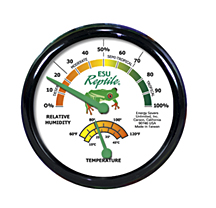Reptile Lighting
Lighting is very important for keeping reptiles. For most species two
types of lighting are needed. I will highlight the different types.
1. Full Spectrum lights are fluorescent and go by many different brand names. We have a few listed below. The full-spectrum lights help mimic natural sunlight. In nature reptiles, snakes and amphibians bask in the sunlight for warmth but also because sitting in the sunshine helps create vitamin D in the reptiles body naturally. Supplements of D3 help but nothing works better than light to make D3 naturally. Many also believe that the full-spectrum lighting also helps normalize behavior in reptiles.
2. Incandescent Light. This is the standard bulbs that generate heat. These are great for generating heat in your reptile enclosure. It should be used with full-spectrum lighting of some sort.
3. BL-Black Lights. Many herptoculturalists swear by Black Lights because they produce much more UV-A then full-spectrum. They use this for a couple hours per day to mimic the sun at it?s highest point. There is some evidence, although anecdotal, that the Black Lights help with fertility and calcium metabolism more than just full spectrum alone.
4. UV-B Generating Bulbs. These are fluorescent sunlamps. They are
getting easier to find lately. Reptiles should be given a small amount
per day if you think it is needed. 10 to 15 minutes is more than
enough. Longer exposure could burn reptiles. It seems that the use of
this form of lighting, even for 10 minutes per day, can help stop
metabolic bone disease.
5. Red Lights are mainly used so that you can see reptile movement at night. They can also provide small amounts of beneficial heat.
6. Sunlight is great for all reptiles even if you can only provide them with a few hours of natural sunlight per week. Nothing works as well as the real thing. If you can set up an outdoor vivaria for summer hours of sunlight your reptile will be healthier and happier for it.

